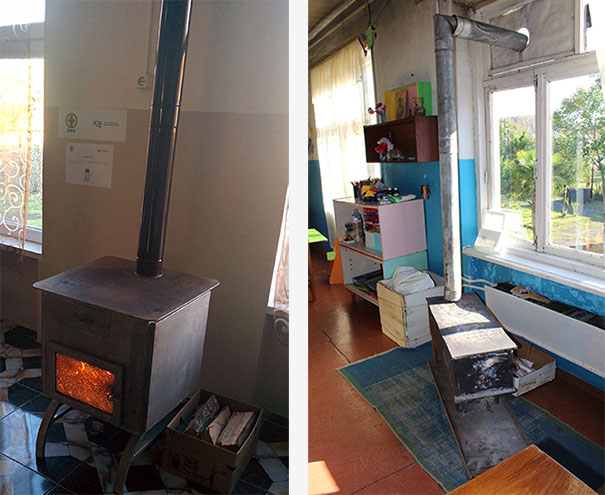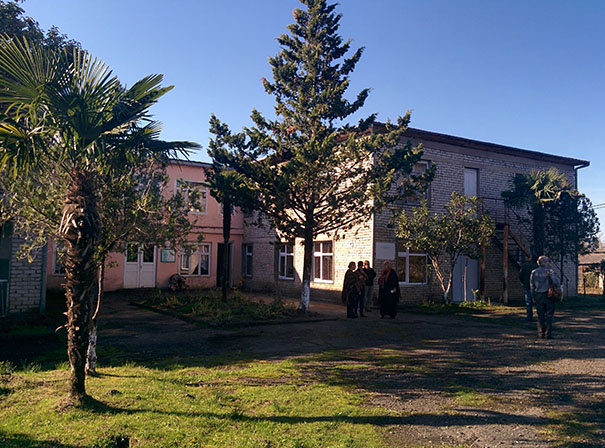For families living in poverty, it can be hard to plan for the long term. When your daily challenges are hunger and cold or you’re trying to determine how a meager income can cover basic expenses, less immediate challenges often fade into the background to be dealt with later.
When I visited the village of Pirveli Maisi in Khobi municipality, Georgia, it struck me that CWS’s Renewable Energy Technologies program helps bridge that gap by meeting both immediate and more long term challenges.
In Georgia, our team at CWS partners with Rural Community Development Agency to help families and community institutions access renewable energy technologies. At the moment, we’re working with 550 households in five municipalities across Georgia to support the installation and use of fuel efficient stoves, solar dryers, solar heaters, dry toilets, composting units and more.

The new, efficient stove (left) uses less firewood and keeps the air cleaner than the older stoves (right) that will soon be upgraded. Photos: Dragan Srekovic / CWS
In Pirveli Maisi, we’re helping the local kindergarten install fuel efficient stoves. They have the first of four already installed in the cafeteria. When we visited the classrooms, where the older, scrappy stoves are still in use, there was smoke in the air. Students and staff alike spend their time breathing in smoke; the teachers love meal times since that’s when everyone will be breathing clean air for a bit in a warm and cozy room.
The staff at the school were so enthusiastic about the new technology, too. I asked them what improvement they would like to next, after the rest of the stoves are installed. The question had barely left my mouth when they jumped in to tell me that they want a solar water heater next. By installing that on the roof, they can use less electricity to heat water.
Fuel efficient stoves use less wood. Solar water heaters use less electricity. Why is this important?
Think about a family’s situation when hunger and cold are daily challenges. When each dollar is being stretched to cover basic expenses, paying less for expensive firewood or for electricity is a big deal. It’s the freedom to spend that income to meet other needs. It is peace of mind.
There’s another great effect to this program that I realized during my visit. The installation of these renewable energy products is leading to a new level of civic mindedness. Environmental concerns used to be a low priority, since families in poverty have little choice about the impact they need to make to survive. Now, though, people are starting to think about the larger impact. Using a solar dryer is good for a family because they can generate income and use less electricity. They know that the electricity comes from a coal-fired power plant, so they see their environmental footprint getting smaller. Using less firewood means that there will be more forests left intact. Future generations will be healthier and better equipped because of these technologies, and families are acknowledging that when getting involved in this program.
Our program is growing. We continue to work with families and institutions that are role models to expand interest in these devices. For example, when parents pick up their children at the kindergarten, they see the new stove in action and are interested. Talks are underway already with the local government to start a government program in which they would co-finance production of fuel efficient stoves.
Our Renewable Energy Technologies program is fighting poverty while also protecting our environment. It is a win-win!
Dragan Srekovic is a Program and M&E Officer with CWS in Europe. Thanks to Laura Curkendall, Associate Director of Communications, for her help with this piece.

